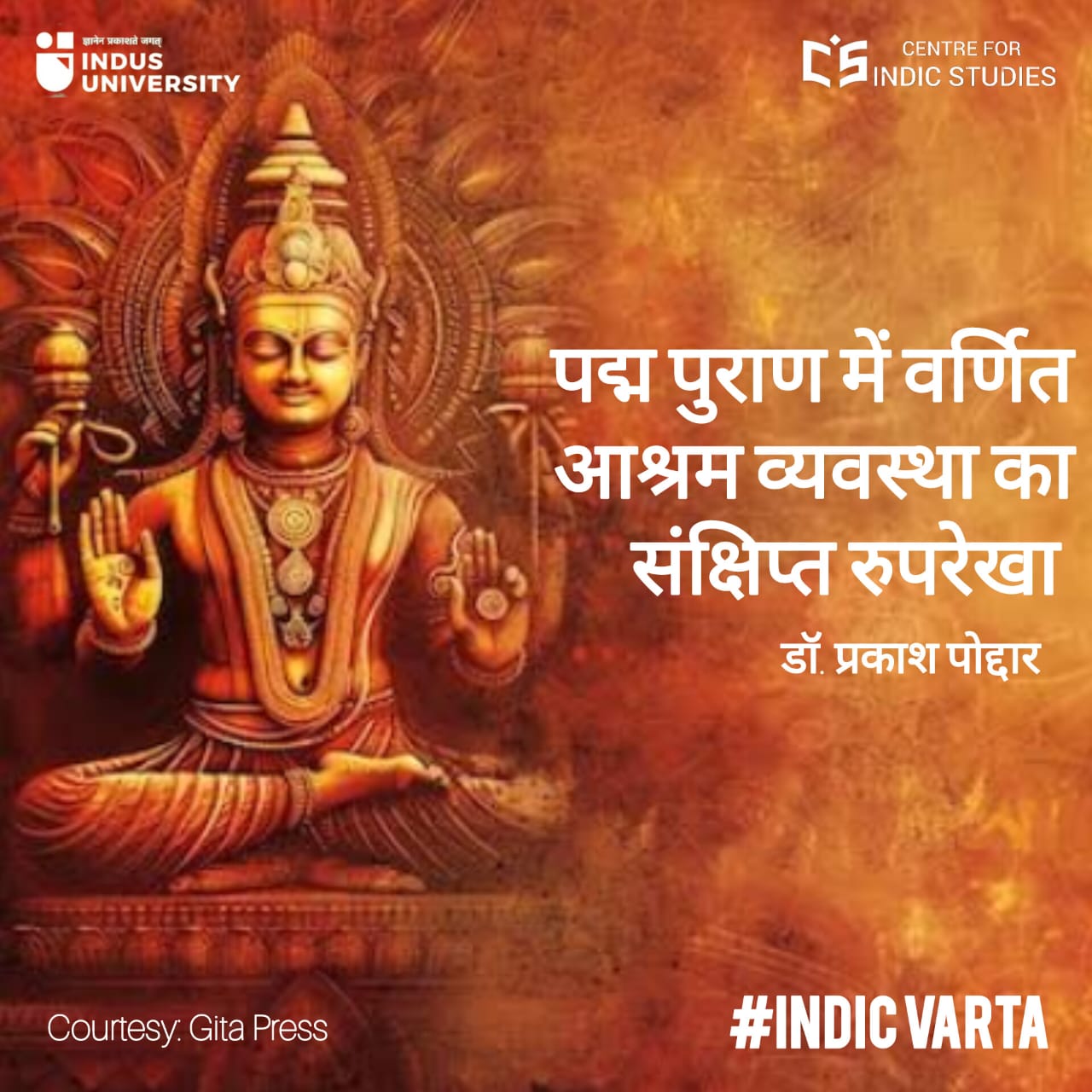- Visitor:398
- Published on:
Tale of Raja Shibi: An ultimate epitome of sacrifice, protecting food chain and sustaining biodiversity (C20_Indic Wisdom Series_Sustainable Lifestyle)
The story shows how for the Hindus a good king also means a good protector. And, balancing both the sides who are deprived and offering equal justice is also an essential part of dharma. Also, the event highlights how birds and animals are given equal respect alongside human beings in Hinduism. The ancients understood long before that it is vital to balance both mankind and nature and sustain biodiversity. The narration of the entire event by Lomash Muni also kept on resonating in Yudhisthira’s mind. His heart filled with immense pride on realizing to be born into such a line of righteous rulers. What an epic scene of sacrifice indeed! Its truth continuously floated clearly in front of his eyes for a long time. After prolonged suffering, now all the Pandavas were charged up enough to spread their wings for the upcoming future.
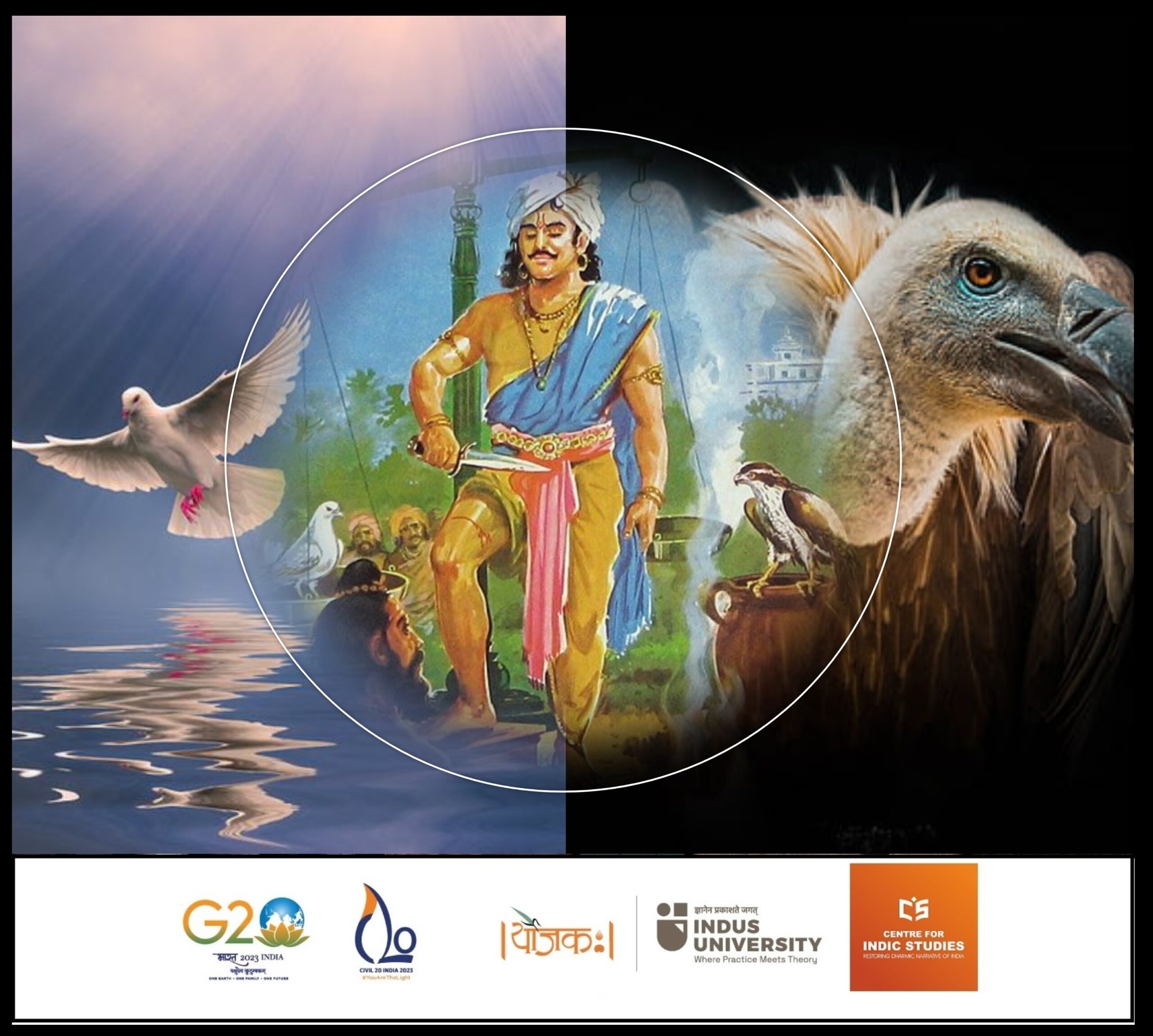
On their way to pilgrimage, that day, the Pandava brothers appeared at the source of river Yamuna through the Kashmir Valley. Lomasha Muni, their companion pointed his finger forward addressing Yudhisthira, “Can you see there? The two rivers you see on both sides of Yamuna are called Jala and Upajala. There the yajna of charity by the great king Ushinara Shibi was performed and it excelled even that of Indra’s”.
This information was enough to raise question in Yudhisthira’s ever enquiring mind. He looked at Lomsha Muni with his usual eager eyes. Getting the wise Lomasha in hand, the Pandavas didn’t want to lose any scope this time. All of their ears were waiting to hear the whole story of Ushinar Shibi. Munivar understood their silent urge and so began to tell the story of Ushinar Shibi even before they question. The saint started with his story, “The tale of Shibi is very holy. Till when there will be respect for holy men left in this world, people will remind and admire this guy….”.
Shibi was an eminent ruler of the Chandravamsha or Lunar dynasty. Being the son of Ushinara, the king of Kashi, he was also known as Ushinar Shibi and Ushinar. Also, he was contemporary to the Suryavanshi King Trayarunya who was the ancestor of Rama. He was known for his emotional intelligence and his heart never set back when it came to protect humanity. With his power and valour, he was able to free his kingdom from enemies and kept all his subjects happy. Gradually he turned highly popular throughout the world for his piousness and administrative abilities. The quantity and standard with which he performed all the yajnas were still unmatched by the king of gods Indra himself. Moreover, while performing all his tasks, with proper balance in mind, he always remained steady in his Dharma too.
Gradually, his power, like a crust, gave shelter to the entire earth. Everybody on the planet witnessed the mighty roar of his chariot. And, on this single chariot, he managed to bring the whole planet under one umbrella. With all his sacrifices, he used to donate every animal resource he had. Even, Lord Brahma surmised that amongst all the kings, considering the past and the future, there would be none other than him. He surpassed Indra with his guts and eventually his fame reached heaven, in the abode of gods.
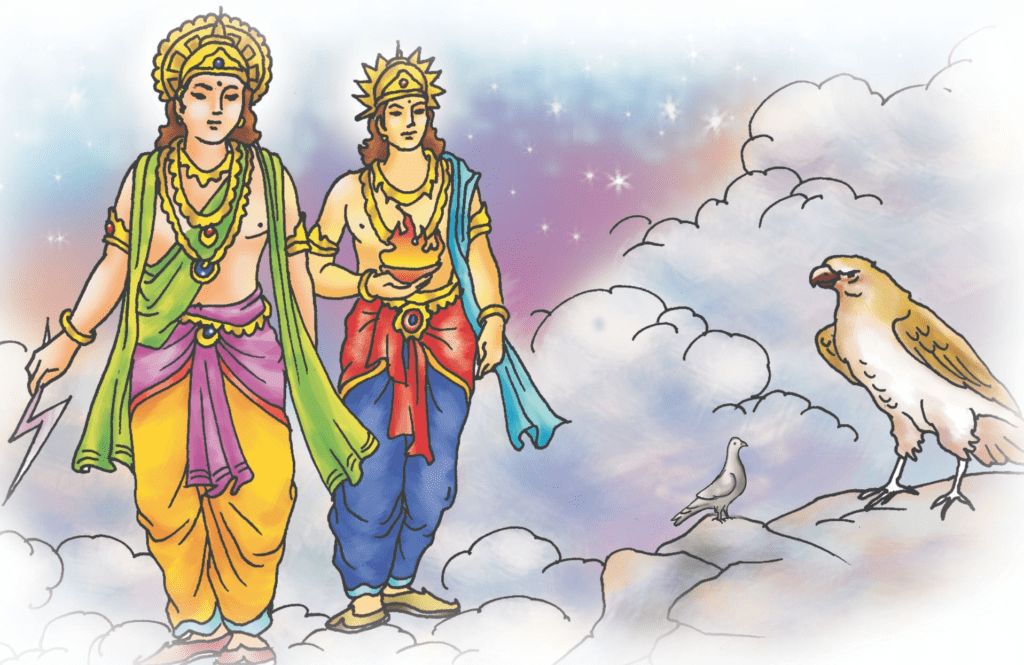
Agni, the fire god had already saved Mahishmatipuri with his cleverness, and for this intelligence, he was very beloved of Indra. Once, Agnidev started praising King Shibi in front of Indra. The king of gods always disliked the praises of others in front of him. As Agni blurted out that people now a days, compare Indra with King Shibi, then the face of Indra got raged with anger.
“What do you think? To what extent can this man remain devoted to his dharma?”, facing Agni, dubious Indra uttered, “Come. Let’s examine him”.
So, to test more of his qualities, lord Indra turned into a wild-eyed vulture and Agni took the disguise of a tiny timid pigeon and both of them set forth flying towards Ushinar’s kingdom.
The king was sitting in his court, busy with a yajna. At once, a quill of a bird flew floating down in front of everyone. It was the little pigeon that came flying. It perched on the king’s thigh and took refuge in his lap. As everyone turned their head outside they found the vulture is also coming flying with a rush towards the assembly. It was understood that the smaller creature is trying its best to avoid being preyed upon by the bigger birdie. The carnivore broke into the hall and was trying to manage a path to get hold of the little one but getting blocked due to the king’s position.
“Hand it over to me”, the vulture bawled in a human voice, as it landed in front of everyone, “O King. I am extremely hungry. You cannot snatch the food from my mouth like this. Give some value to my appetite and also my penance in chasing it. It is well known that you are a very pious person. Hope you will not poke your nose into my matter”.
However, Shibi nodded his head and gently brushing the little creature’s back with his fingers he advised against it by saying, “O pakshivar, this is my refuge. Look how it is dying out of fear. I will not commit such an act. Protecting the one who has surrendered is a king’s dharma. Leaving him will be a sin equivalent to killing a wise man or a cow. I warn you. Don’t assume it to be a sitting duck anymore. I have taken it under my wing. Till I am here you cannot touch its feather. I think this was a wild goose chase from your side”. Now, from that point, a philosophical debate erupted between the king and the attacker.
The vulture argues, “Kee-eeeee-arr…. You are the wisest and eagle-eyed when it comes to interpret dharma. At least the public says so. But, O blind man! You have only seen the duty of the time from your point of view. But, you fail to accept the consequences of your action.”
The king interrupts the point and says, “But, in a kingdom where the ruler is unable to give protection to his people, no crops will grow, no rain will shower and the land would become barren. Getting cursed by his people, as a result, the king goes to hell!”.

The vulture hopped forward and continues with the debate screeching, “Oh really??… Cak…cak…cak… Your lines are making me sick as a parrot! Living organisms stay alive by taking other living being as food. A pigeon is a food for a vulture. This is nature’s rule. Everyone knows it. Ask anyone in your court who is as wise as an owl. This is nothing new. Can’t you see that in this way I am always contributing towards maintaining the proper balance of nature through my consumption? Here, hunting is my Dharma. I feed my family with my prey. Your act will not only shatter the ecological balance of the food cycle but also it will deprive me of my dharma. Think over! What will I answer to my wife and children who are waiting in hungry stomachs in my nest? What about their curse on you? If you snatch my food for today, will I be able to live tomorrow? Is this the way you rule the roost??”
Note that what we understand by Dharma in our common understanding, for that, here, a bird is just giving a logical but totally contrary definition. On the other side, the king has no other answer in his store than what he has learned from the syllabus of his rulebook till now. This is what we call “Dharm sankat”.
Now, at this point, the bird continues forward with his inextricable argument. He comes up with the shloka that says, “Dharmam yo badhate dharmo na sa dharmah kudharmkah”.

This particular verse is there in Mahabharata and is addressed to Satyavikrama. It means that any dharma that violates another’s dharma is not true dharma. Rather, it is bad dharma. On the other hand, if one’s dharma flourishes without harming other’s interest is indeed a true dharma. It is true that today we try to equate “dharma” with religion. And, today’s foreign religions of medieval era origin cannot sustain without disturbing or demolishing other’s religions. Nevertheless, to continue with the story and realize its essence, we must keep in mind that in this story dharma is not religion. And, in this very context dharma is the consciousness that upholds truth, compassion with helping hands, promoting of non-violence and maintaining of balance in society.
A big “Dharm sankat” has arisen, in front of the crowd between two contradictory dharmas. An absurd silence absorbed the entire court full of public. At one end, there is the life of the pigeon which is trembling with fear, while there is the question of justice for the vulture. Intelligent Shibi realized that the argument from the other side is irrefutable. And, his opponent is also indomitable.
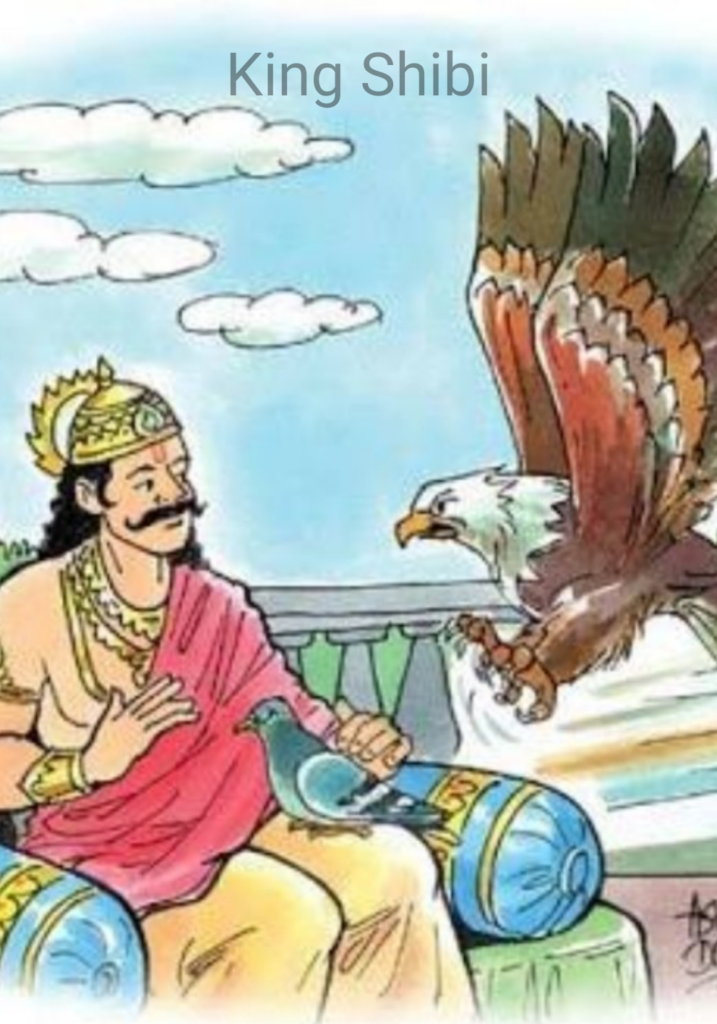
But, being firm in his own dharma, Shibi said, “O agitator, calm down… calm down. You want flesh, right? Will that satisfy you? Then I am bringing for you meats of deer, boars, buffalo or anything more from the royal kitchen’s store room. Trust me those foods are tastier! How much can you gobble? Go save yourself and your family from the fire of hunger! But leave my tiny feathered friend for now”.
However, the vulture remained unmoved and stated, “It will be better if you give me the permission to dive into the pigeon, peck it and take wing”.
Now, showing more greed, Shibi tried his best to divert the mind of the vulture by promising, “I will gift you a prosperous kingdom. But, please take your mind out from this poor creature. Look, it is also too tiny to satisfy your requirements”. He further added up with his statement saying, “Okay, do you have any other idea in your mind? Please tell me. Tell me if you know any other way that I can approach and save this little creature and which will also benefit you”.
Indra in the disguise of the vulture was ready to reply and with his determined eyes said, “Ha ha… but sorry king. I cannot change my diet and food habit because of your dharma. Leave my victim alone and move aside. I ingest only fresh flesh”.
The vulture continued with his words, moved more forward and confronted him by saying, “It seems that you are very much fond of this tiny chick. Come…come… exchange yourself with it. Can you? Will you give me flesh from your own body equal in measure to the pigeon’s mass? Then, I will think of changing my mind”. Listening to this all the courtiers was left shocked.
Now the situation demanded an epic reaction from Shibi. And, the poet of the epic provided us with that which was needed in this context for the ultimate protection of dharma. The way in which Shibi weighed up the situation carefully, with the promise he made in front of everyone, made the public remain staggered.
Shibi looked to be quite pleased with the adjustment. He happily accepted the challenge.

“Hold on, hungry vulture! Let me kill two birds with one stone. I will now chop off flesh equal in weight of the pigeon’s whole mass, from my own body. Can flap your wings with joy now! Come have it”, and declaring that, with the help of his court mates, he arranged for a big scalepan, took his sit on the ground at one side and placed the pigeon on the pan of the other side.
He started to cut his parts one by one and brutally injuring himself, left his body bruised and poked all over with blood. Surprisingly, even after keeping a lot of meat on the pan, the scale towards the pigeon still remained anyhow heavier. Smeared with blood, Shibi managed to tolerate his sufferings and continued doing his work and submitted more flesh from his body on the scale. But, the pan did not move. It seemed that all his muscles felt as light as a feather in front of the pigeon’s whole body mass. Ultimately, as the fleshes he kept on the balance was unable to balance the pigeon’s weight, he got up and sat on the scale-pan himself.
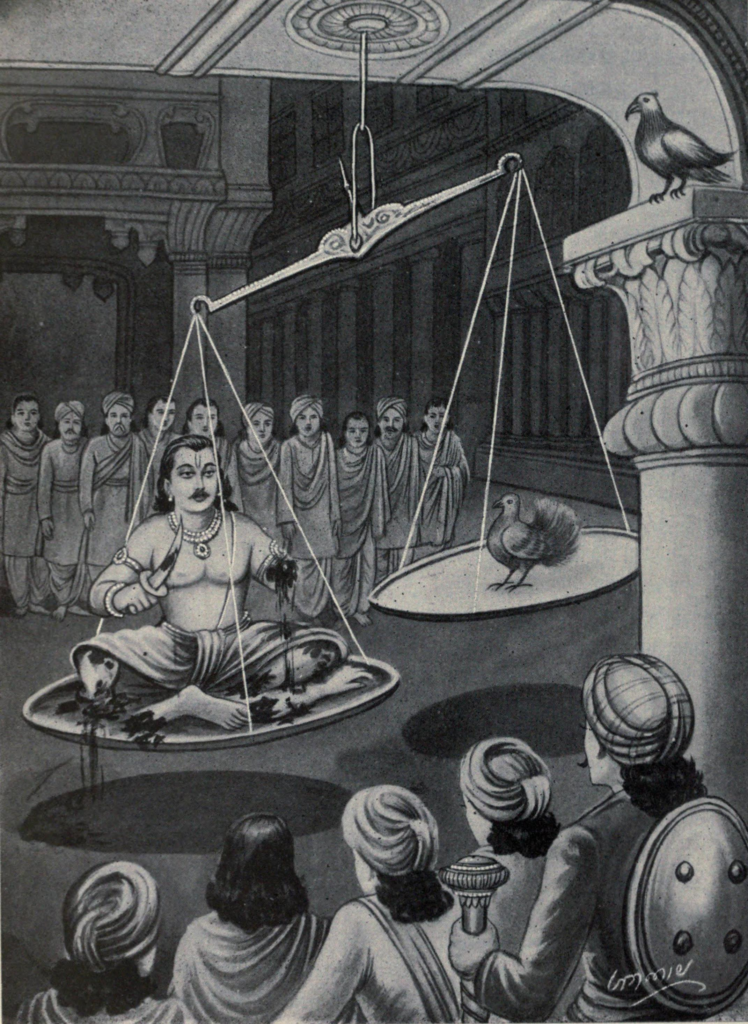
Now, seeing his miserable condition and pain, Indra and Agni came to their original form. This was unexpected for all and left everyone stunned and surprised.
Satisfied with the king’s determination and compassion, healing all his wounds and addressing him, the two God’s said, “O Rajan, no comparison can’t be made in your commitment towards dharma. To protect a refuge, the self-sacrifice you made is rare in the world. Passed the test with flying colors! Bravo, what a great example you are! May you remain immortal in the speech of everyone, in the coming days, for your actions”.
Showering him with lots of blessings Indra and Agni returned back. Shibi also remained faithful to his dharma till his last breath, performed many yajnas and at the right time left his body while always engaged in benefit of others. Whenever people talk about great donors, his name is surely taken.
Lomasha Muni ended the story here with a deep sigh, saying, “O Yudhisthira, did you know…wandering in the holy land where Shibi had once ruled and performed his yajnas and by reminding this wonderful story of the king, the mind becomes pure”.
Nonetheless, the story establishes the ancient king as an extreme protector and giver. And, from here the hero of Mahabharata, Yudhisthira learned that the delicate and fine bar between Dharma and Adharma can’t be only understood just from the scriptures and other’s teachings. Hinduism is not a religion of books. Dharma depends on time and discretion of the situation and surroundings.
Above all, the story shows how for the Hindus a good king also means a good protector. And, balancing both the sides who are deprived and offering equal justice is also an essential part of dharma. Also, the event highlights how birds and animals are given equal respect alongside human beings in Hinduism. The ancients understood long before that it is vital to balance both mankind and nature and sustain biodiversity.
The narration of the entire event by Lomash Muni also kept on resonating in Yudhisthira’s mind. His heart filled with immense pride on realizing to be born into such a line of righteous rulers. What an epic scene of sacrifice indeed! Its truth continuously floated clearly in front of his eyes for a long time. After prolonged suffering, now all the Pandavas were charged up enough to spread their wings for the upcoming future.
There are many different narratives found for the same story in Indian scriptures. In many versions of Mahabharata, it is mentioned that before going back Agni blessed Shibi saying that the meat he sacrificed from his sorely wounded body will return and become golden and shine as a holy and beautiful sign of royalty. Later, he gave birth to a brave and dharmic son whose name was Kapatroma (kapat=pigeon) as per the fire god’s blessings.
The Chinese version of the story:
One of the two versions is ditto the same, just the pronunciations vary. There, Shibi is pronounced as Shibbi with a strong emphasis on “h”. Another version is taken from Jatakmala. There, Indra disguised as a blind person requests the king for eyesight. And, king Shibbi pierces his own eyes and donates to Indra.
The Japanese version of the story:
Here, Shibi is believed to be a previous incarnation of Shakyamuni Buddha. One day, a heavenly being named Bishamon visits God Taishaku and informs him that there is Shibi, ruling on the earth and who is also a great Bodhisattva himself. It will be not late for him to transform into a Buddha. Then both of them jointly decided to check his sincerity toward achieving enlightenment. Taishaku becomes the vulture and asks Bishamon to turn into a pigeon.
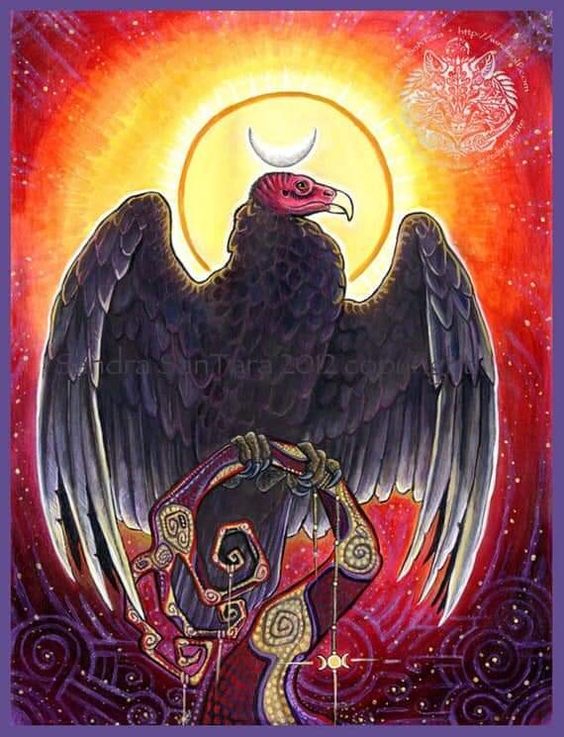
References:
পায়রা বাঁচাতে রাজার প্রাণ বাজি – mythology characters indra dev and agni dev – EisamayStory of the Great King Shibi (apnisanskriti.com)
Maharaj Shibi – The king who sacrificed his body to save a bird (arungovil.in)
Facebook page of Hinduism (The forgotten facts)
পর্ব-৫২: উশীনরের ধর্মভাব পরীক্ষা করলেন বাজরূপী ইন্দ্র | সময় Updates (samayupdates.in)https://ayansays658370864.wordpress.com/2020/03/09/
Center for Indic Studies is now on Telegram. For regular updates on Indic Varta, Indic Talks and Indic Courses at CIS, please subscribe to our telegram channel !
- 199 min read
- 0
- 0







